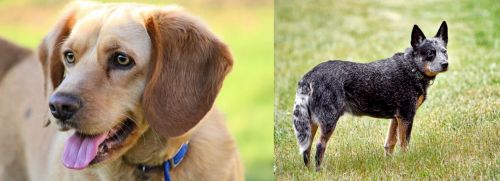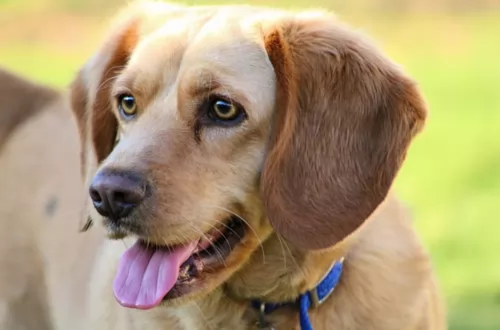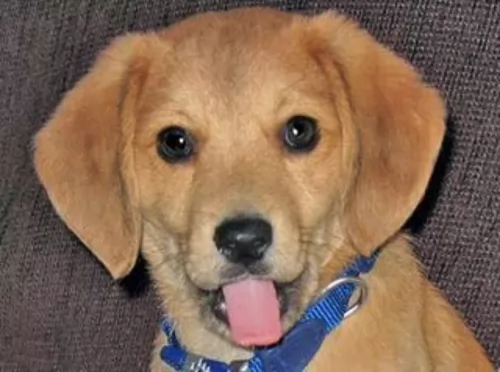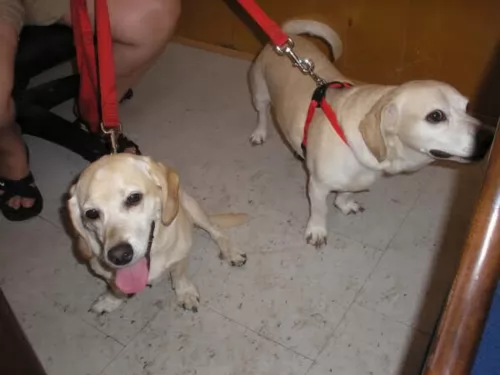 MyDogBreeds
MyDogBreeds Beago is originated from United States but Austrailian Blue Heeler is originated from Australia. Beago may grow 9 cm / 3 inches shorter than Austrailian Blue Heeler. Both Beago and Austrailian Blue Heeler are having almost same weight. Both Beago and Austrailian Blue Heeler has almost same life span. Beago may have more litter size than Austrailian Blue Heeler. Beago requires Moderate maintenance. But Austrailian Blue Heeler requires High maintenance
Beago is originated from United States but Austrailian Blue Heeler is originated from Australia. Beago may grow 9 cm / 3 inches shorter than Austrailian Blue Heeler. Both Beago and Austrailian Blue Heeler are having almost same weight. Both Beago and Austrailian Blue Heeler has almost same life span. Beago may have more litter size than Austrailian Blue Heeler. Beago requires Moderate maintenance. But Austrailian Blue Heeler requires High maintenance
 Made up of two purebred dog breeds, the Beagle and the Golden Retriever, Beago is kind of new breed. Some say that they were bred on purpose during the 1980s, in a desire to create a smart and loving dog that will be a smaller size than the Golden Retriever since this will make them ideal for indoor life.
Made up of two purebred dog breeds, the Beagle and the Golden Retriever, Beago is kind of new breed. Some say that they were bred on purpose during the 1980s, in a desire to create a smart and loving dog that will be a smaller size than the Golden Retriever since this will make them ideal for indoor life.
 In 1840, George Elliott made a match with Australian Dingo and Collie and got a clever and very active dog breed – Australian Blue Heeler. Soon, he showed his good herding instincts and protective nature and got really popular among the cattlemen and ranchers. Soon, as the USA soldiers arrived in Australia, they decided that it will be a great dog to bring home.
In 1840, George Elliott made a match with Australian Dingo and Collie and got a clever and very active dog breed – Australian Blue Heeler. Soon, he showed his good herding instincts and protective nature and got really popular among the cattlemen and ranchers. Soon, as the USA soldiers arrived in Australia, they decided that it will be a great dog to bring home.
Australian Blue Heeler has short, double coat. The coat is water resistant and helps them when the temperature is too high as well. Their coat is rough to the touch, naturally. They can be found in blue or red coat colour mix. The Blue Heeler isn’t actually blue, but their black coat has a bluish tint. Red Heelers have red fur instead of black. They have long tails, strong legs, Dingo-like heads with pointy ears and muscular necks and balanced and athletic bodies.
 Beago is a medium-sized dog with a usually tri-coloured coat that can vary in some colours. They have usually short hairs because sometimes happens that they have longer hairs if the Golden retriever genes are stronger. Their hairs are soft to the touch and they don’t shed a lot and that makes them easy to maintain. They have dark coloured eyes, floppy ears, and they have the body shape of the Beagle, but they are very active and muscular like the Golden Retriever.
Beago is a medium-sized dog with a usually tri-coloured coat that can vary in some colours. They have usually short hairs because sometimes happens that they have longer hairs if the Golden retriever genes are stronger. Their hairs are soft to the touch and they don’t shed a lot and that makes them easy to maintain. They have dark coloured eyes, floppy ears, and they have the body shape of the Beagle, but they are very active and muscular like the Golden Retriever.
 This breed is somehow designed for an outdoor life and outdoor activity. This implies that Blue Heelers have nature made of the high dose of energy. They are always ready to go anywhere you go, and they will be a loyal friend. They are actually very clever, intelligent and ready to help.
This breed is somehow designed for an outdoor life and outdoor activity. This implies that Blue Heelers have nature made of the high dose of energy. They are always ready to go anywhere you go, and they will be a loyal friend. They are actually very clever, intelligent and ready to help.
If you are a type of the person who prefers being indoors and having minimal physical activity, Blue heelers are not the type of a furry companion for you. They have a high daily need for the activity, and they love having lots of space to run and explore. Sometimes, you will realize that having a leash is a must because they will get so playful that they will forget about you!
If you start teaching them to be friendly with other dogs while they are still pups, they will accept that kind of lifestyle. But, if your Blue Heeler is raised as the only dog on the ranch, note that they won’t be very friendly toward other dogs.
Since most of the herd dogs usually respond to only one person, most of the Blue Heelers can follow this old instinct. They can be very independent, as well, and they are usually not the type of the dog that will always be around your leg waiting for a cuddle or ear scratch. But, they build the respect towards humans depending on how they treat him so they can be very lovable and friendly pets.
If you are still confused about their name, you must know that the Blue Heelers can actually lightly nip your heel for attention. They are not aggressive, but they tend to be very protective of the family, humans around them and their property.
 They are very good with children of all age.
They are very good with children of all age.
Hunting, search, rescue dog, agility competitions.
Beago will love living in a house with a bog yard. As well, he will have a happy life in the apartments as long as you take him out for his daily activity. They get along with other pets, so any other dog or cat will be great company for him. They are usually well mannered in public places, if you train them and socialize, but they will always bark if there is someone strange in your house. They are very good with children of all age.
Beage is very smart breed. They will pick up new tricks very quickly and remember it forever. They would love learning new tricks once you include treats as rewards, but you must be careful not to overfeed him.
 They are generally good with children, but you must be aware of their inherent desire to herd. Always supervise when your Blue Heeler is around small children.
They are generally good with children, but you must be aware of their inherent desire to herd. Always supervise when your Blue Heeler is around small children.
Ball tricks, frisbee fun, running companion, herding cattle.
It is best to buy a puppy. These dogs get attached to one human and to the territory.
They are generally quick learners. If you teach them to be playful, friendly and loving, they will learn it in no time. So be aware of the decisions that can cost you when the dog grows up.
 There are no general health issues with this breed. The health history shows that they have common health problems as any other active dog – problems with hips and elbows. Because of their floppy ears, they are prone to infections and diseases caused by lack of ear hygiene. Some of them have skin allergies. The best advice is always to make regular vet checks. Then you and your Beago can live a happy and long life.
There are no general health issues with this breed. The health history shows that they have common health problems as any other active dog – problems with hips and elbows. Because of their floppy ears, they are prone to infections and diseases caused by lack of ear hygiene. Some of them have skin allergies. The best advice is always to make regular vet checks. Then you and your Beago can live a happy and long life.
 Progressive Retinal Atrophy usually causes slow and painless loss of sight. This process takes years, but there are cases where this disease took only months before the dog ended up completely blind.
It is advisable to take your Blue Heeler to the vet for a test that can tell you if your dog is carrying the gene for this disease.
Progressive Retinal Atrophy usually causes slow and painless loss of sight. This process takes years, but there are cases where this disease took only months before the dog ended up completely blind.
It is advisable to take your Blue Heeler to the vet for a test that can tell you if your dog is carrying the gene for this disease.
Lens luxation is a disease where the lens of dog’s eye separates partially or completely. Good news is that this disease can be treated.
Most common is the hip or elbow dysplasia. This is the disease where hip joints do not develop properly and begin to grind. This condition can sometimes be treated with physiotherapy, but there is a chance that your Blue Heeler will need a surgery. If you have a habit of regular vet checks and keeping your dog slim and fed with quality food, you can a make a big difference.
Osteochondritis Dissecans (OCD) causes the dog to have excess cartilage and deficient bone, where cartilage does not get replaced by bone during fetal development. This disease usually requires surgery and prescribed medicines.
Congenital hereditary sensorineural deafness – CHSD is a common form of deafness.
Bilateral deafness can be identified when the dog is still a puppy, more-less at six weeks of age. A puppy with deafness in only one ear is harder to identify, but it can happen.
Portosystemic shunt means that the blood flow is getting back into the bloodstream instead of passing through the liver. That means that liver can’t clear out the toxins, and the organ itself fails to grow properly. This inherited type of shunt can be treated with surgery if the diagnose is set on time.
 The best tip is to feed them with quality dry food. Canned food can be given once in week or less. They will love cheese and meat in their meal. Since they like to munch, they will eat almost any raw fruit or vegetables. Until you Beago is six months old, feed him tree time per day. Keep the feeding schedule unchanged to form a habit and avoid problems with metabolism.
The best tip is to feed them with quality dry food. Canned food can be given once in week or less. They will love cheese and meat in their meal. Since they like to munch, they will eat almost any raw fruit or vegetables. Until you Beago is six months old, feed him tree time per day. Keep the feeding schedule unchanged to form a habit and avoid problems with metabolism.
Since they don’t shed a lot, grooming your Beago will be easy. They won’t need an everyday brush, but it will be good if you could brush him two times per week and bathe once in a month. Their floppy ears need regular care as well. They need to be cleaned with the ear cleaning solution at least once a week. They will need regular nail trimming as well. They need quality food because they are very active dogs. Make sure not to overfeed them. Daily activity is a must.
Beago is very active breed. They like to spend time outdoors, running, playing fetch, jumping. They will love visiting the dog park or any park that is close to your house. They are very good if taken hiking.
 Choose a dog food that will provide nutrients that will help in the bone developing. Since they are more likely to suffer from joint diseases, you must take this advice seriously. It would be great if you speak about this with your vet before you choose food on your own.
Choose a dog food that will provide nutrients that will help in the bone developing. Since they are more likely to suffer from joint diseases, you must take this advice seriously. It would be great if you speak about this with your vet before you choose food on your own.
The best food for Blue Heeler is a high-quality food which supplies them with premium nutrition to fuel their activity.
They also drink a lot of water, so be sure that they always have a fresh water available.
Lots and lots of the outdoor activity and a quality food. You must be very cautious because this kind of dogs gets overweight easily because they just love the treats and extra food portion.
Any outdoor activity that is mentally challenging and interesting enough to keep them from running in the field trying to catch anything that moves.